Places
- Strabo (crater), a lunar crater
Strabo ('squinter') was a term given by the Romans to anyone whose eyes were distorted or crooked or affected by strabismus.

The 20s decade ran from January 1, AD 20, to December 31, AD 29.
The 0s BC were the period between 9 BC and 1 BC, the last nine years of the before Christ era. It is one of two "0-to-9" decade-like timespans that contain nine years, along with the 0s.
80s BC is the time period from 89 BC – 80 BC.

Dacia was the land inhabited by the Dacians, its core in Transylvania, stretching to the Danube in the south, the Black Sea in the east, and the Tisza in the west. The Carpathian Mountains were located in the middle of Dacia. It thus roughly corresponds to the present-day countries of Romania, as well as parts of Moldova, Bulgaria, Serbia, Hungary, Slovakia, and Ukraine.

Strabo was a Greek geographer, philosopher, and historian who lived in Asia Minor during the transitional period of the Roman Republic into the Roman Empire.
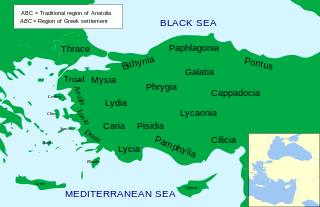
Paphlagonia was an ancient region on the Black Sea coast of north-central Anatolia, situated between Bithynia to the west and Pontus to the east, and separated from Phrygia by a prolongation to the east of the Bithynian Olympus. According to Strabo, the river Parthenius formed the western limit of the region, and it was bounded on the east by the Halys River. Paphlagonia was said to be named after Paphlagon, a son of the mythical Phineus.
The Atrebates were a Belgic tribe of the Iron Age and the Roman period, originally dwelling in the Artois region.

The Getae or Gets were a Thracian-related tribe that once inhabited the regions to either side of the Lower Danube, in what is today northern Bulgaria and southern Romania. Both the singular form Get and plural Getae may be derived from a Greek exonym: the area was the hinterland of Greek colonies on the Black Sea coast, bringing the Getae into contact with the ancient Greeks from an early date. Although it is believed that the Getae were related to their westward neighbours, the Dacians, several scholars, especially in the Romanian historiography, posit that the Getae and the Dacians were the same people.
Gnaeus, also spelled Cnaeus, was a Roman praenomen derived from the Latin naevus, a birthmark. It was a common name borne by many individuals throughout Roman history, including:
Polemon I Pythodoros was the Roman Client King of Cilicia, Pontus, Colchis and the Bosporan Kingdom. Polemon was the son and heir of Zenon and possibly Tryphaena. Zenon and Polemon adorned Laodicea with many dedicated offerings.
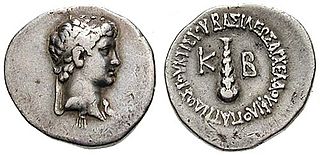
Archelaus was a Roman client prince and the last king of Cappadocia. He was also husband of Pythodorida, Queen regnant of Pontus.
Ptolemy was an Alexandrian mathematician, astronomer, geographer and astrologer.
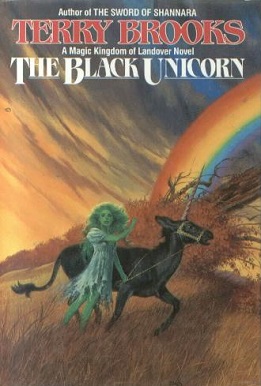
The Black Unicorn is the second novel in the Magic Kingdom of Landover series by Terry Brooks, and the follow-up to Magic Kingdom for Sale—Sold!. Published in 1987, the book revolves around the evil wizard Meeks, attempting to wrest control of the kingdom from Ben Holiday, the High Lord and the appearance of a mythical black unicorn in the kingdom.
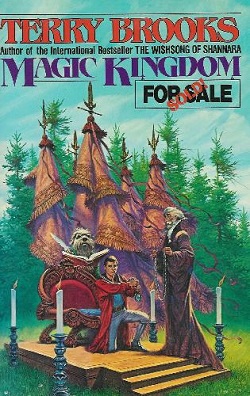
Magic Kingdom for Sale—Sold! is a fantasy novel by American writer Terry Brooks, the first in his Magic Kingdom of Landover series. Written in 1986, it tells the story of how Ben Holiday, a talented but depressed Chicago trial lawyer, comes to be king of Landover, an otherworldly magical kingdom. The book was re-released as part of a Landover omnibus in 2009.

The Magic Kingdom of Landover is a series of six fantasy novels by Terry Brooks following the adventures of a former trial lawyer named Ben Holiday, who purchases a magical kingdom.
Dynamis, nicknamed Philoromaios, was a Roman client queen of the Bosporan Kingdom during the Late Roman Republic and part of the reign of Augustus, the first Roman Emperor. Dynamis is an ancient Greek name which means the “powerful one”. She was a monarch of Iranian and Greek Macedonian ancestry. She was the daughter of King Pharnaces II of Pontus and his Sarmatian wife. She had an older brother called Darius and a younger brother called Arsaces. Her paternal grandparents had been the monarchs of the Kingdom of Pontus, Mithridates VI of Pontus and his first wife Laodice, who was also his sister. Dynamis married three times. Her husbands were Asander, a certain Scribonius and Polemon I of Pontus. According to Rostovtzeff, she also had a fourth husband, Aspurgos.

A Princess of Landover by Terry Brooks is the sixth novel of the Magic Kingdom of Landover series.
Vopiscus may refer to:
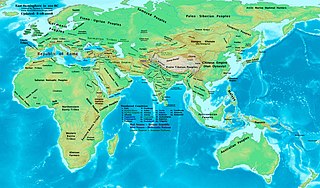
The Aorsi, known in Greek sources as the Aorsoi (Ἄορσοι), were an ancient Iranian people of the Sarmatian group, who played a major role in the events of the Pontic Steppe from the 1st century BC to the 1st century AD.